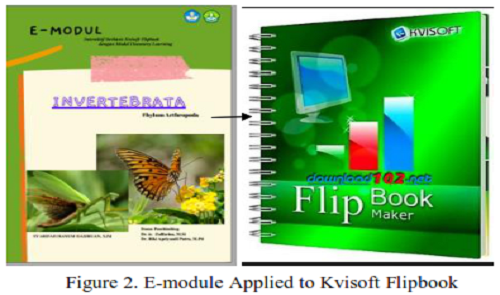
Development of Interactive E-Modules Based on Kvisoft Flipbook with Discovery Learning Models on Arthropod Material to Improve Student Learning Outcomes
Abstract
Keywords
Full Text:
PDFReferences
Anderson, L. W, & Krathwohl, D. R. (2001). A Taxonomy For Learning, Teaching And Assessing: A Revision Of Bloom's Taxonomy Of Educational Objectives, 352.
Basilaia, G., & Kvavadze, D. (2020). Transition to Online Education in Schools During a SARS-CoV-2 Coronavirus (COVID-19) Pandemic in Georgia. Pedagogical Research, 5(4).
Budiarti, S., Nuswowati, M., & Cahyono, E. (2016). Guided Inquiry Berbantuan e-Modul untuk Meningkatkan Keterampilan Berpikir Kritis. Journal of Innovative Science Education, 5(2), 144-151.
Imansari, N., & Sunaryantiningsih, I. (2017). Pengaruh Penggunaan e-Modul Interaktif Terhadap Hasil Belajar Mahasiswa pada Materi Kesehatan dan Keselamatan Kerja. VOLT: Jurnal Ilmiah Pendidikan Teknik Elektro, 2(1), 11-16.
Ivanova, T., Gubanova, N., Shakirova, I., & Masitoh, F. (2020). Educational Technology as one of The Terms for Enhancing Public Speaking Skills. Universidad y Sociedad, 12(2), 154-159.
Mariana, M. & Wulandari, D. (2018). Development of a Pocket Book Based on Mind Mapping in Science Learning, 9 (1). 75-80.
Masykur, R., Nofrizal, N., & Syazali, M. (2017). Development of Mathematics Learning Media with Macromedia Flash (in Bahasa). Al-Jabar: Jurnal Pendidikan Matematika, 8(2), 177-186.
Nieveen, N. (1999). Prototyping to Reach Product Quality. Design approaches and tools in education and training, 125-135.
Nugraha, A., & Subarkah, C. Z. (2015). Sari.(2015). Penggunaan e-Module Pembelajaran pada Konsep Sifat Koligatif Larutan untuk Mengembangkan Literasi Kimia Siswa. Prosiding Simposium Nasional Inovasi dan Pembelajaran Sains, 201-204.
Putra, K. W. B., Wirawan, I. M. A., & Pradnyana, G. A. (2017). Pengembangan e-Modul Berbasis Model Pembelajaran Discovery Learning pada Mata Pelajaran “Sistem Komputer” untuk Siswa Kelas X Multimedia SMK Negeri 3 Singaraja. Jurnal Pendidikan Teknologi dan Kejuruan, 14(1).
Rasiman, R., & Agnita, S. P. (2014). Development of Mathematics Learning Media e-Comic Based on Flip Book Maker to Increase the Critical Thinking Skill and Character of Junior High School Students. International Journal of Education and Research, 2(11), 535-544.
Sari, B. K. (2017). Learning Design in the Era of the Asean Economic Community (AEC) for Progressive Indonesian Education,ISBN 978-602-70216-2-4
Sukri, A., & Purwanti, E., (2013). Improving Student Learning Outcomes Through Brain Gym. Journal of Mathematics and Science Education, 1 (1).
Sumintono, B., & Widhiarso, W. (2015). Aplikasi Pemodelan Rasch pada Assessment Pendidikan. Trim komunikata.
Susanti, F., (2015). Emodule Development Using the Kvisoft Flipbook Maker Application on the Subject of Static Fluids for Class X High School/Ma Students. Repository Uin Sunan Kalijaga Yogyakarta.
Supriadi, N. (2015). Mengembangkan Kemampuan Koneksi Matematis melalui Buku Ajar Elektronik Interaktif (BAEI) yang Terintegrasi Nilai-Nilai Keislaman. Al-Jabar: Jurnal Pendidikan Matematika, 6(1), 63-74.
Uno, H. B. (2016). Development of Website-Based IPS Learning Media for Grade VII Students of State Madrasah Tsanawiyah, 18 (3), 12-20.
Wibowo, E., & Pratiwi, D. D. (2018). Pengembangan Bahan Ajar Menggunakan Aplikasi Kvisoft Flipbook Maker Materi Himpunan. Desimal: Jurnal Matematika, 1(2), 147-156.
Widyawati, S. (2016). Pengaruh Kemampuan Koneksi Matematis Siswa terhadap prestasi Belajar Matematika Ditinjau dari Gaya Belajar pada Materi Bangun Ruang Sisi Datar Siswa Kelas IX SMP di Kota Metro. Jurnal Iqra': Kajian Ilmu Pendidikan, 1(1), 47-68.
Parenduri, W. M., & Rambe, T. R., (2022). Development of a Digital Book Using the Kvisoft Flipbook Application Based on Problem Solving to Improve Higher Level Thinking Skills of Junior High School Students, 3(3), 168-181.
Yuliasari, E. (2017). Eksperimentasi Model PBL dan Model GDL Terhadap Kemampuan Pemecahan Masalah Matematis Ditinjau dari Kemandirian Belajar. JIPM (Jurnal Ilmiah Pendidikan Matematika), 6(1), 1-10.
DOI: http://dx.doi.org/10.31258/jes.7.3.p.452-464
Refbacks
- There are currently no refbacks.
Copyright (c) 2023 Syarifah Hasibuan, Syarifah Hasibuan

This work is licensed under a Creative Commons Attribution 4.0 International License.
Publisher: FKIP Universitas Riau












